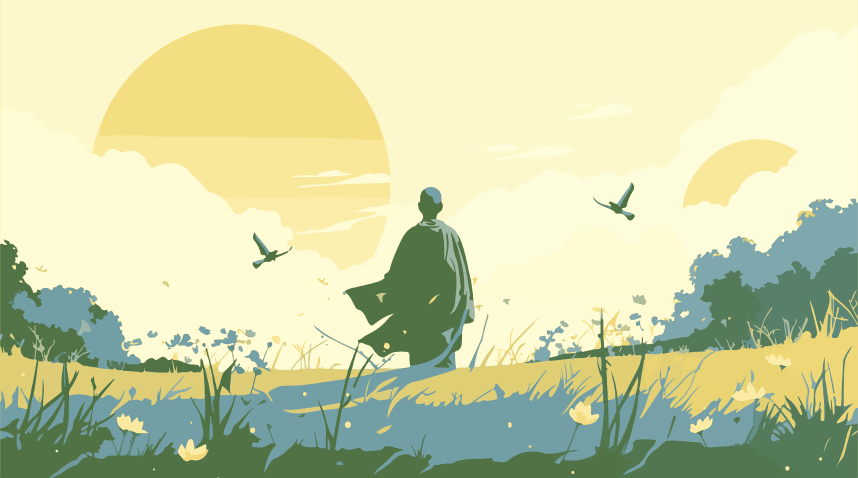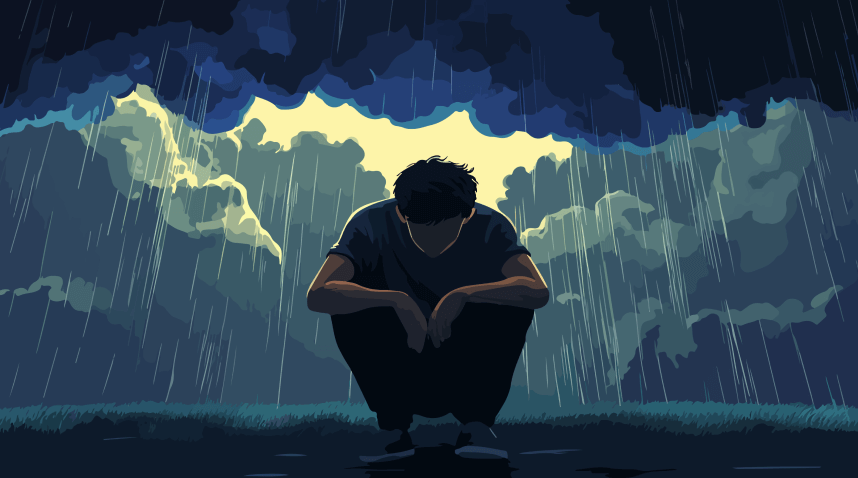TLDR: Starting a Buddhist practice might alienate you from old friends, but it’s part of the journey. Learn how to navigate this ‘lonely chapter’ and find peace in your new path.
When one decides to embark on the Buddhist path, leaving behind the familiar routines of mundane life, they often encounter a period of solitude.
This phase, which we might call “the lonely chapter,” is a critical and challenging part of the Dhamma journey. This is a journey I often noticed in Dhamma friends who did not grow up Buddhist but rather discovered the path in their 20s/30s.
The chapter begins subtly

It’s a time of transformation, self-discovery, and often, a feeling of alienation. As you trade material pursuits for spiritual ones, you may find yourself walking a path that few around you understand or appreciate.
“Why aren’t you any fun like before? Scared you say something wrong and go to hell?” some friends might jest.
The journey begins subtly. Perhaps you start meditating daily, or you become more mindful of your actions and their consequences. You might begin to question long-held beliefs about success, happiness, and the nature of reality. What used to excite you—like getting a promotion, being a startup founder, or being top on LinkedIn—now rings a little bit more hollow.
As your perspective shifts, you may notice a growing disconnect between yourself and your usual social circles.
Friends & family struggles
Friends and family might not understand why you’re suddenly less interested in nights out or material wants. Snide remarks like, “Oh you are now some Buddha boy, too zen to chill with us,” or “You are no fun if you don’t drink,” start to surface as they feel their image of you changing.
The person that they love and know is slowly vanishing. Their remarks are a manifestation of that fear of losing their image of you. But remember, it is a mere perception.
They may struggle to relate when you talk about concepts such as impermanence or the nature of suffering. Your newfound interest in simplicity and detachment might seem alien or even threatening to those accustomed to your old way of life.
“Why are you always going on meditation retreats? Why not go travel to Japan to shop?” can be thrown at your face as you try to share your holiday plans in a social setting.
It seems difficult to share why retreats are important to you without getting too deep into the Dhamma.
You might find yourself spending more time in solitary meditation or Dhamma study, further widening the gap between you and your old life. Less attracted to crowds and nightlife and more drawn to conditions that arise peace.
You’re no longer fully immersed in your old lifestyle, but you’re not yet part of a new Buddhist community.
You might feel like you’re standing at a crossroads, neither here nor there, understood by neither your old friends nor more seasoned practitioners. It is like stepping each leg on different footpaths with a chasm forming between them. You have to choose.
Powering through the lonely chapter
This lonely chapter, however challenging, is a crucial part of the journey. It’s a time of deep personal growth and self-discovery. As you detach from old habits and thought patterns, you create space for new insights and understanding.
The solitude provides an opportunity for introspection and self-examination that is essential to progress on the Buddhist path.
During this time, you might grapple with doubts. Is this path worth the social isolation from old friends? Are you making the right choice in distancing yourself from familiar comforts? It can ultimately be answered by putting in reasonable investments of effort and then seeing the results.
It’s important to remember that such questioning is normal and even beneficial. The Buddha himself encouraged followers to question and investigate, rather than blindly accept teachings.
When you know for yourselves that, “These qualities are skillful; these qualities are blameless; these qualities are praised by the wise; these qualities, when adopted & carried out, lead to welfare & to happiness” — then you should enter & remain in them.’
The opportunity to be in peace

The lonely chapter also serves as a practical application of Buddhist principles. It’s an opportunity to practice equanimity in the face of discomfort, to observe attachment and aversion as they arise, and to cultivate compassion for yourself and others who may not understand your journey.
As you progress, you may find that the nature of your loneliness changes. Initially, it might feel like a loss – a separation from familiar people and activities. But gradually, it can transform into a more peaceful solitude, one that feels spacious and fertile rather than empty and isolating.
What initially feels like a void left by old attachments can become a space of potential, free from the constraints of fixed ideas and identities. Your solitude becomes less about what you’ve left behind and more about the vast potential of what lies ahead.
You see the world differently, you see things more simply without having to pass much value judgment or to be stirred by it. You find this peace accessible.
Seek circles
It’s crucial during this time to seek support where you can find it. While your immediate circle might not understand your path, there are likely Buddhist communities, either local or online, where you can connect with others on similar journeys. These connections can provide encouragement, guidance, and a sense of belonging as you navigate your lonely chapter.
Reading the teachings of Buddhist masters can also provide comfort and inspiration. Many have written about their own experiences of isolation and transformation. Their words can serve as a reminder that you’re not alone in your journey, even when it feels that way.
Ajahn Chah, a great meditation master has his struggles laid out bare for all readers to see in the book ‘Stillness Flowing’. It includes the very raw struggle of fighting sexual attraction as a celibate monk.
As you progress on the path, you may find that your loneliness begins to ease. You might connect with a community who share your spiritual interests. You may also find that your relationship with solitude has changed – what once felt lonely now feels peaceful and nourishing.
As the practice deepens
Moreover, as your practice deepens, you might find yourself better able to connect with others, even those who don’t share your spiritual path. The compassion and mindfulness cultivated through Buddhist practice can lead to more authentic and meaningful relationships across all areas of life.
Remember, the lonely chapter is not a permanent state, but a transitional one. It’s a cocoon in which transformation occurs.
Just as a caterpillar must endure the solitude of its chrysalis to emerge as a butterfly, so too must the Dhamma seeker endure a period of isolation to emerge with new wisdom and understanding.
In embracing this lonely chapter, you’re not just enduring a difficult phase, but actively participating in your Dhamma evolution. The solitude, the questioning, the detachment from old ways – these are all integral parts of the path. They are the soil from which your deeper understanding and practice will grow.
As you navigate this lonely chapter on your Buddhist journey, remember the old saying “Peace comes from within. Do not seek it without.” (Commonly wrongly attributed to the Buddha)
In your solitude, you’re not just experiencing loneliness – you’re cultivating the inner peace that lies at the heart of Buddhist practice.
Ma Nivatta Abhikkama – Advance, Never Falter


